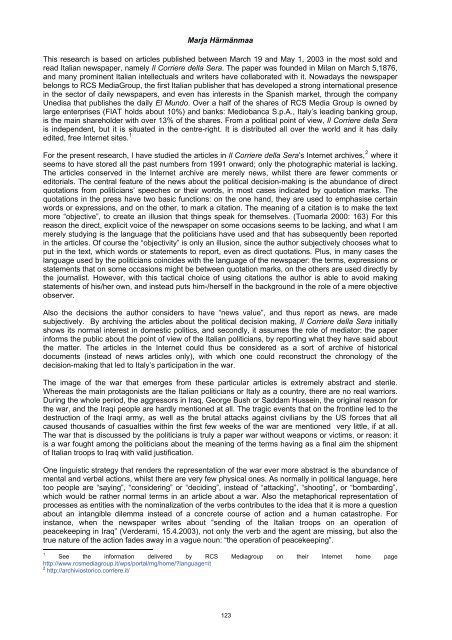(in) Security - Academic Conferences Limited
(in) Security - Academic Conferences Limited
(in) Security - Academic Conferences Limited
You also want an ePaper? Increase the reach of your titles
YUMPU automatically turns print PDFs into web optimized ePapers that Google loves.
Marja Härmänmaa<br />
This research is based on articles published between March 19 and May 1, 2003 <strong>in</strong> the most sold and<br />
read Italian newspaper, namely Il Corriere della Sera. The paper was founded <strong>in</strong> Milan on March 5,1876,<br />
and many prom<strong>in</strong>ent Italian <strong>in</strong>tellectuals and writers have collaborated with it. Nowadays the newspaper<br />
belongs to RCS MediaGroup, the first Italian publisher that has developed a strong <strong>in</strong>ternational presence<br />
<strong>in</strong> the sector of daily newspapers, and even has <strong>in</strong>terests <strong>in</strong> the Spanish market, through the company<br />
Unedisa that publishes the daily El Mundo. Over a half of the shares of RCS Media Group is owned by<br />
large enterprises (FIAT holds about 10%) and banks: Mediobanca S.p.A., Italy’s lead<strong>in</strong>g bank<strong>in</strong>g group,<br />
is the ma<strong>in</strong> shareholder with over 13% of the shares. From a political po<strong>in</strong>t of view, Il Corriere della Sera<br />
is <strong>in</strong>dependent, but it is situated <strong>in</strong> the centre-right. It is distributed all over the world and it has daily<br />
edited, free Internet sites. 1<br />
For the present research, I have studied the articles <strong>in</strong> Il Corriere della Sera’s Internet archives, 2 where it<br />
seems to have stored all the past numbers from 1991 onward; only the photographic material is lack<strong>in</strong>g.<br />
The articles conserved <strong>in</strong> the Internet archive are merely news, whilst there are fewer comments or<br />
editorials. The central feature of the news about the political decision-mak<strong>in</strong>g is the abundance of direct<br />
quotations from politicians’ speeches or their words, <strong>in</strong> most cases <strong>in</strong>dicated by quotation marks. The<br />
quotations <strong>in</strong> the press have two basic functions: on the one hand, they are used to emphasise certa<strong>in</strong><br />
words or expressions, and on the other, to mark a citation. The mean<strong>in</strong>g of a citation is to make the text<br />
more “objective”, to create an illusion that th<strong>in</strong>gs speak for themselves. (Tuomarla 2000: 163) For this<br />
reason the direct, explicit voice of the newspaper on some occasions seems to be lack<strong>in</strong>g, and what I am<br />
merely study<strong>in</strong>g is the language that the politicians have used and that has subsequently been reported<br />
<strong>in</strong> the articles. Of course the “objectivity” is only an illusion, s<strong>in</strong>ce the author subjectively chooses what to<br />
put <strong>in</strong> the text, which words or statements to report, even as direct quotations. Plus, <strong>in</strong> many cases the<br />
language used by the politicians co<strong>in</strong>cides with the language of the newspaper: the terms, expressions or<br />
statements that on some occasions might be between quotation marks, on the others are used directly by<br />
the journalist. However, with this tactical choice of us<strong>in</strong>g citations the author is able to avoid mak<strong>in</strong>g<br />
statements of his/her own, and <strong>in</strong>stead puts him-/herself <strong>in</strong> the background <strong>in</strong> the role of a mere objective<br />
observer.<br />
Also the decisions the author considers to have “news value”, and thus report as news, are made<br />
subjectively. By archiv<strong>in</strong>g the articles about the political decision mak<strong>in</strong>g, Il Corriere della Sera <strong>in</strong>itially<br />
shows its normal <strong>in</strong>terest <strong>in</strong> domestic politics, and secondly, it assumes the role of mediator: the paper<br />
<strong>in</strong>forms the public about the po<strong>in</strong>t of view of the Italian politicians, by report<strong>in</strong>g what they have said about<br />
the matter. The articles <strong>in</strong> the Internet could thus be considered as a sort of archive of historical<br />
documents (<strong>in</strong>stead of news articles only), with which one could reconstruct the chronology of the<br />
decision-mak<strong>in</strong>g that led to Italy’s participation <strong>in</strong> the war.<br />
The image of the war that emerges from these particular articles is extremely abstract and sterile.<br />
Whereas the ma<strong>in</strong> protagonists are the Italian politicians or Italy as a country, there are no real warriors.<br />
Dur<strong>in</strong>g the whole period, the aggressors <strong>in</strong> Iraq, George Bush or Saddam Husse<strong>in</strong>, the orig<strong>in</strong>al reason for<br />
the war, and the Iraqi people are hardly mentioned at all. The tragic events that on the frontl<strong>in</strong>e led to the<br />
destruction of the Iraqi army, as well as the brutal attacks aga<strong>in</strong>st civilians by the US forces that all<br />
caused thousands of casualties with<strong>in</strong> the first few weeks of the war are mentioned very little, if at all.<br />
The war that is discussed by the politicians is truly a paper war without weapons or victims, or reason: it<br />
is a war fought among the politicians about the mean<strong>in</strong>g of the terms hav<strong>in</strong>g as a f<strong>in</strong>al aim the shipment<br />
of Italian troops to Iraq with valid justification.<br />
One l<strong>in</strong>guistic strategy that renders the representation of the war ever more abstract is the abundance of<br />
mental and verbal actions, whilst there are very few physical ones. As normally <strong>in</strong> political language, here<br />
too people are “say<strong>in</strong>g”, “consider<strong>in</strong>g” or “decid<strong>in</strong>g”, <strong>in</strong>stead of “attack<strong>in</strong>g”, “shoot<strong>in</strong>g”, or “bombard<strong>in</strong>g”,<br />
which would be rather normal terms <strong>in</strong> an article about a war. Also the metaphorical representation of<br />
processes as entities with the nom<strong>in</strong>alization of the verbs contributes to the idea that it is more a question<br />
about an <strong>in</strong>tangible dilemma <strong>in</strong>stead of a concrete course of action and a human catastrophe. For<br />
<strong>in</strong>stance, when the newspaper writes about “send<strong>in</strong>g of the Italian troops on an operation of<br />
peacekeep<strong>in</strong>g <strong>in</strong> Iraq” (Verderami, 15.4.2003), not only the verb and the agent are miss<strong>in</strong>g, but also the<br />
true nature of the action fades away <strong>in</strong> a vague noun: “the operation of peacekeep<strong>in</strong>g”.<br />
1 See the <strong>in</strong>formation delivered by RCS Mediagroup on their Internet home page<br />
http://www.rcsmediagroup.it/wps/portal/mg/home/?language=it<br />
2 http://archiviostorico.corriere.it/<br />
123

















